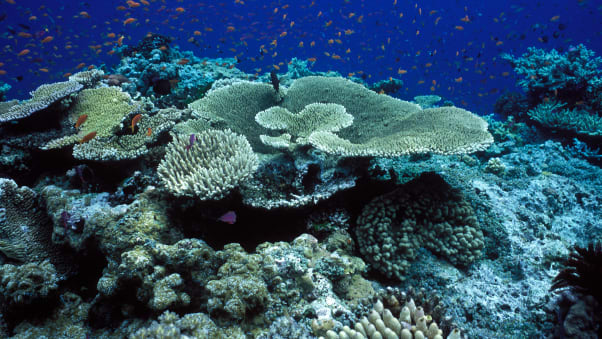(CNN) -
Australia's Great Barrier Reef has lost 50% of its coral populations in the past three decades, and climate change is a key driver of reef disturbance, according to a new study.
Researchers at the ARC Center of Excellence for Coral Reef Studies, in Queensland, northeast Australia, assessed coral communities and their colony size along the Great Barrier Reef between 1995 and 2017, and found depletion of virtually all coral populations, they reported Tuesday.
Coral reefs are some of the most vibrant marine ecosystems on the planet: between a quarter and a third of all marine species depend on them at some point in their life cycle.
The Great Barrier Reef, the world's largest coral reef, covers nearly 344,468 square kilometers and is home to more than 1,500 species of fish, 411 species of hard coral, and dozens of other species.
"We found that the number of small, medium and large corals on the Great Barrier Reef has declined by more than 50% since the 1990s," reported co-author Terry Hughes, Distinguished Professor at the ARC Center of Excellence for Reef Studies of the United States. Coral in a statement.
advertising
Reefs are critical to the health of marine ecosystems;
without them, ecosystems collapse and marine life dies.
The Great Barrier Reef covers almost 344,468 square kilometers.
The size of the coral population is also considered vital when it comes to the reproductive capacity of the coral.
"A vibrant coral population has millions of tiny baby corals - as well as many huge ones - the big moms that produce the most larvae," said Andy Dietzel, a doctoral student at the ARC Center of Excellence for Coral Reef Studies. it's a statement.
"Our results show that the Great Barrier Reef's resilience - its resilience - is compromised compared to the past, because there are fewer babies and fewer large breeding adults," he added.
MORE: The Great Barrier Reef just experienced its most widespread bleaching event on record
Experts found that the population declined in both shallow and deep-sea coral species, but branched and table-shaped corals, which provide habitats for fish, were the hardest hit by mass bleaching events in 2016 and 2017. , caused by record temperatures.
Warm ocean temperatures are the main driver of coral bleaching, when corals turn white in response to stress from water that is too hot.
Bleaching does not kill coral immediately, but if temperatures remain high, eventually the coral will die, destroying a natural habitat for many species of marine life.
Tuesday's study found more pronounced deterioration of coral colonies in the Northern and Central Great Barrier Reef following mass bleaching events in 2016 and 2017.
Climate change is driving an increase in the frequency of "reef disturbances," the report's authors warned.
The Great Barrier Reef has suffered several massive bleaching events in the past five years, and experts said the southern part of the reef was also exposed to record temperatures in early 2020.
"We used to think that the Great Barrier Reef is protected because of its sheer size, but our results show that even the largest and relatively well-protected reef system in the world is increasingly compromised and in decline," Hughes said.
The report's authors warned that climate change is driving an increase in the frequency of "reef disturbances" such as marine heat waves.
"There is no time to lose;
we must drastically reduce greenhouse gas emissions as soon as possible, "the authors of the report warned in the article, published in the journal Proceedings of the Royal Society.
CNN's Helen Regan contributed to this report.
Great Barrier Reef

